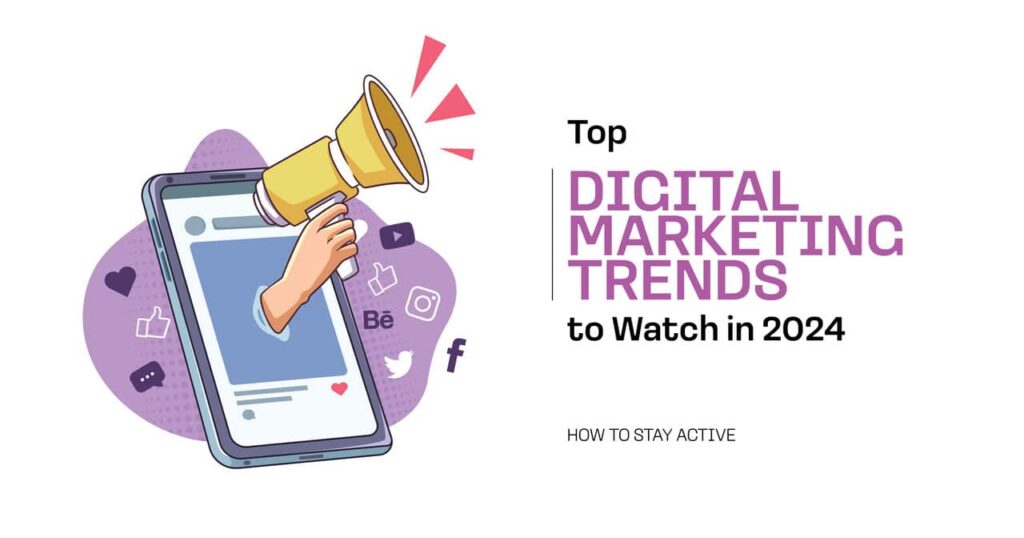Introduction
Welcome to the digital marketing frontier of 2024! If you’ve been watching the rapidly changing digital marketing landscape, you know that staying ahead is essential for maintaining a competitive edge. Digital marketing strategies are evolving fast, and with the rise of new technologies like artificial intelligence, blockchain technology, and the expansion of social media platforms, marketers must adapt to capture the attention of their target audience.
Essential Takeaways
- Embrace AI and Machine Learning: Leverage AI-driven tools for personalized experiences, chatbots for customer service, and predictive analytics for making informed decisions.
- Optimize for Voice Search: Adapt your content creation strategy to accommodate voice search by using natural language and focusing on local SEO.
- Experiment with New Technologies: Stay ahead by testing and incorporating AR, VR, and blockchain-powered loyalty programs into your marketing strategy. Also, keep learning about emerging trends to innovate continuously.
The Digital Marketing Landscape in 2024
Why Do Digital Marketing Trends Matter?
The way we approach digital marketing efforts changes rapidly as we adopt new technological advancements and strategies. Staying up-to-date with these trends isn’t just about keeping pace; it’s about leveraging new opportunities to connect with your target audience. One such innovation includes interactive content, which enhances the user experience by making it more engaging and impactful. As conscientious consumers demand more transparency, brands are also shifting toward ethical practices, such as native advertising and contextual advertising that feel authentic.
Artificial Intelligence: The Key to Personalization
In 2024, artificial intelligence (AI) and machine learning (ML) have become integral to modern marketing. AI has revolutionized how brands deliver relevant content, allowing for personalized experiences tailored to consumer behaviors. Whether through predictive analytics or AI-powered blockchain solutions, marketers are able to provide more value to potential customers by analyzing vast amounts of first-party data.
AI-driven Tools and Automation
Additionally, AI-driven tools have empowered marketing teams by automating repetitive tasks, freeing them up to focus on higher-level digital marketing strategies. Smart speakers, for instance, continue to grow in popularity, pushing marketers to optimize for voice search.
Video and Social Media Trends
The rise of short-form videos across popular platforms like TikTok, Instagram Reels, and YouTube Shorts has transformed the way brands interact with their audience engagement. These social media channels have proven to be powerful acquisition channels that drive traffic and user engagement.
Interactive Video Content
Incorporating user-generated content into your video marketing mix is a great way to build trust and foster community-based marketing. Interactive experiences, such as live video streams and interactive tools, allow users to directly engage with your content, leading to higher consumer engagement.
Data Privacy and Ethical Marketing
With the phasing out of third-party cookies, marketers need to pivot toward collecting and using first-party cookies and Zero-party data. This shift emphasizes the importance of maintaining customer trust and building strong relationships with your audience through transparency.
Influencer Marketing and Social Commerce
Influencer marketing is another area that continues to evolve. With the increasing reliance on social media platforms, brands are tapping into micro-influencers who have highly engaged, niche audiences.
Expansion of Social Commerce
Social commerce strategies are expanding, allowing brands to sell directly on social channels like Instagram and TikTok, further blending the lines between social media and e-commerce.
Voice Search and the Future of Search Engines
The rise of voice search has changed how users interact with search engines. Search queries are becoming more conversational and specific, requiring marketers to adapt their SEO strategies. Brands should focus on capturing search intent by providing relevant content that answers common voice search questions.
Contextual and Native Advertising
Contextual advertising and native advertising are set to grow as brands strive to provide a personal touch in their marketing messages. Instead of relying on intrusive ads, advertising agencies are shifting toward more natural forms of promotion that align with the content the user is consuming.
The Role of Data in Digital Marketing
Analyzing digital content is now easier than ever with tools like Semrush Traffic Analytics and Semrush .Trends. These tools provide valuable insights into Traffic trends and can help brands understand how users interact with their website.
Leveraging First-Party Data
Moreover, first-party data and Zero-party data are becoming essential to shaping a brand’s digital marketing strategy. By focusing on data privacy and building customer trust, brands can create personalized experiences without relying on third-party cookies.
The Importance of Voice Search and Image Recognition
With the increasing use of smart speakers and tools like Google Lens, users can now search with their voice or images. This growing trend of accurate search allows brands to optimize for both voice search and image-based search, expanding their reach to a wider audience.
Social Commerce and Evolving Consumer Trends
Social commerce is growing rapidly, allowing customers to purchase products directly through social media platforms. Consumers prefer shopping within the social apps they frequently use, such as Instagram and TikTok.
Conclusion: Staying Ahead of the Curve
By understanding and adopting these current marketing trends, brands can position themselves for success in 2024 and beyond. Whether it’s embracing AI, optimizing for voice search, or leveraging social commerce strategies, the future of marketing is all about personalization and innovation.
Call to Action
Ready to transform your digital marketing strategy for 2024? Contact us today to discover how we can help you stay ahead of the curve with the latest trends and technologies. Let’s work together to create a marketing plan that drives results and positions your brand for success in the coming year. Reach out now for a personalized consultation and take the first step toward a more effective marketing strategy!
FAQs
- What are the key digital marketing trends to watch for in 2024?
The key trends include AI-driven personalization, voice search optimization, short-form videos, influencer marketing, and AR/VR technologies. - How can AI improve my digital marketing strategy?
AI can enhance personalization, automate customer service through chatbots, and provide insights through predictive analytics, helping you tailor your marketing efforts more effectively. - Why is voice search optimization important?
Voice search is becoming more popular, and optimizing for it ensures that your content is easily discoverable through voice-activated devices. This involves focusing on natural language and local SEO. - What are the benefits of using micro-influencers in marketing?
Micro-influencers offer highly engaged and niche audiences, leading to more authentic interactions and effective campaigns than larger, less-engaged influencers. - How can I ensure compliance with data privacy regulations?
Stay updated with data privacy laws, be transparent about data collection practices, and provide users clear opt-in and opt-out options to ensure compliance.







